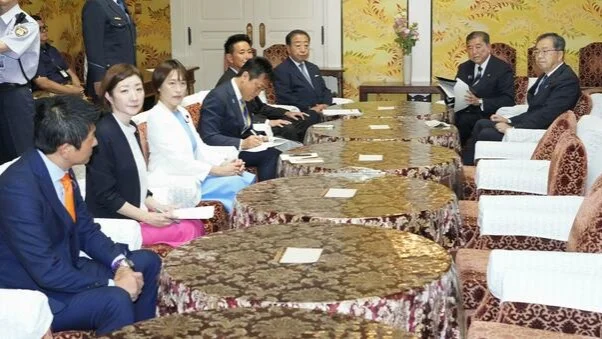Japan PM vows "steady" implementation of U.S. tariff deal
Prime Minister Shigeru Ishiba said Friday he wants to oversee the "steady" implementation of a recently clinched trade deal with the United States as the embattled leader met with opposition leaders amid pressure from inside his own party to resign, Kyodo reports.

Yuichiro Tamaki, head of the Democratic Party for the People, told reporters after the meeting that Ishiba seemed to show a "strong desire" to stay on as premier to see the agreement take effect despite the dismal outcome for the prime minister's ruling coalition in Sunday's upper house election.
Some opposition party leaders, meanwhile, said Ishiba failed to allay their concerns about the agreement and the fact that it has not yet been put into writing.
The leaders' talks, lasting more than an hour at the Diet, were the first since Japan and the United States clinched the trade agreement in Washington on Tuesday, days after the House of Councillors election.
"My worries instead deepened," Tamaki said after the meeting. "We don't know whether the negative impact on the economy and companies can be minimized with the deal."
The trade agreement sets 15 percent auto and "reciprocal" tariffs on Japan, lower than U.S. President Donald Trump had envisioned. It also includes a scheme for $550 billion worth of Japanese investment in the United States.
"We have come to an agreement with the United States that protects the national interests of both nations," Ishiba told his fellow party leaders at the Diet.
The tariff deal, after rounds of talks at the ministerial and summit levels, came at a sensitive time for Ishiba, with his Liberal Democratic Party suffering its worst election performance in years and the ruling camp including its junior coalition partner, Komeito, now left without majority control of both houses of parliament.
He has so far sought to brush aside calls from some LDP members to step down, saying that he should tackle the challenges facing the country.
The lowering of the auto and reciprocal tariffs to 15 percent from a combined 27.5 percent and a proposed country-specific 25 percent, respectively, gave some relief to Japanese automakers and other exporters, lifting Japanese share prices.
A day after the deal was announced, however, the United States said Japan will buy $8 billion in U.S. farm and food goods, such as corn, soybeans, fertilizer and bioethanol. It also said the Asian ally will increase purchases of U.S.-made commercial aircraft, including 100 Boeing planes, and defense equipment worth "additional billions of dollars annually."
Japanese government officials have said there is no discrepancy between the two nations regarding the agreement.
At a government task force meeting earlier in the day, Ishiba instructed officials to take all possible steps to cope with the impact of the U.S. tariffs, which economists expect will still slow the export-driven economy.
Yoshihiko Noda, head of the largest opposition Constitutional Democratic Party of Japan, said the tariff agreement should be formalized in writing at a bilateral summit.
Speaking to reporters, he also revealed that he stressed the need for the government to draw up an economic package to address the tariff fallout.
Ishiba did not make any mention of compiling a supplementary budget for the current fiscal year through next March or whether he will step down or not, according to Noda.
